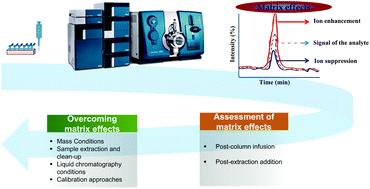Our official English website, www.x-mol.net, welcomes your feedback! (Note: you will need to create a separate account there.)
Overview, consequences, and strategies for overcoming matrix effects in LC-MS analysis: a critical review
Analyst ( IF 4.2 ) Pub Date : 2021-08-30 , DOI: 10.1039/d1an01047f Azadeh Nasiri 1, 2 , Reza Jahani 1 , Shaya Mokhtari 3, 4 , Hassan Yazdanpanah 1, 2 , Bahram Daraei 1 , Mehrdad Faizi 1 , Farzad Kobarfard 3, 4, 5
Analyst ( IF 4.2 ) Pub Date : 2021-08-30 , DOI: 10.1039/d1an01047f Azadeh Nasiri 1, 2 , Reza Jahani 1 , Shaya Mokhtari 3, 4 , Hassan Yazdanpanah 1, 2 , Bahram Daraei 1 , Mehrdad Faizi 1 , Farzad Kobarfard 3, 4, 5
Affiliation

|
The high-performance liquid chromatography-mass spectrometry (LC-MS) technique is widely applied to routine analysis in many matrices. Despite the enormous application of LC/MS, this technique is subjected to drawbacks called matrix effects (MEs) that could lead to ion suppression or ion enhancement. This phenomenon can exert a deleterious impact on the ionization efficacy of an analyte and subsequently on the important method performance parameters. LC-MS susceptibility to MEs is the main challenge of this technique in the analysis of complex matrices such as biological and food samples. Nowadays, the assessment, estimation, and overcoming of the MEs before developing a method is mandatory in any analysis. Two main approaches including the post-column infusion and post-extraction spike are proposed to determine the degree of MEs. Different strategies can be adopted to reduce or eliminate MEs depending on the complexity of the matrix. This could be done by improving extraction and clean-up methods, changing the type of ionization employed, optimization of liquid chromatography conditions, and using corrective calibration methods. This review article will provide an overview of the MEs as the Achilles heel of the LC-MS technique, the causes of ME occurrence, their consequences, and systemic approaches towards overcoming MEs during LC-MS-based multi-analyte procedures.
中文翻译:

LC-MS 分析中克服基质效应的概述、后果和策略:批判性评论
高效液相色谱-质谱 (LC-MS) 技术广泛应用于许多基质的常规分析。尽管 LC/MS 应用广泛,但该技术仍存在称为基质效应 (ME) 的缺陷,可能导致离子抑制或离子增强。这种现象会对分析物的电离效率产生有害影响,进而对重要的方法性能参数产生不利影响。LC-MS 对 ME 的敏感性是该技术在分析复杂基质(例如生物和食品样品)中的主要挑战。如今,在开发方法之前对 ME 的评估、估计和克服在任何分析中都是强制性的。提出了两种主要方法,包括柱后灌注和提取后尖峰,以确定 ME 的程度。根据矩阵的复杂程度,可以采用不同的策略来减少或消除 ME。这可以通过改进萃取和净化方法、改变所采用的电离类型、优化液相色谱条件以及使用校正校准方法来实现。这篇综述文章将概述作为 LC-MS 技术致命弱点的 ME、ME 发生的原因、其后果以及在基于 LC-MS 的多分析物程序中克服 ME 的系统方法。
更新日期:2021-09-21
中文翻译:

LC-MS 分析中克服基质效应的概述、后果和策略:批判性评论
高效液相色谱-质谱 (LC-MS) 技术广泛应用于许多基质的常规分析。尽管 LC/MS 应用广泛,但该技术仍存在称为基质效应 (ME) 的缺陷,可能导致离子抑制或离子增强。这种现象会对分析物的电离效率产生有害影响,进而对重要的方法性能参数产生不利影响。LC-MS 对 ME 的敏感性是该技术在分析复杂基质(例如生物和食品样品)中的主要挑战。如今,在开发方法之前对 ME 的评估、估计和克服在任何分析中都是强制性的。提出了两种主要方法,包括柱后灌注和提取后尖峰,以确定 ME 的程度。根据矩阵的复杂程度,可以采用不同的策略来减少或消除 ME。这可以通过改进萃取和净化方法、改变所采用的电离类型、优化液相色谱条件以及使用校正校准方法来实现。这篇综述文章将概述作为 LC-MS 技术致命弱点的 ME、ME 发生的原因、其后果以及在基于 LC-MS 的多分析物程序中克服 ME 的系统方法。



























 京公网安备 11010802027423号
京公网安备 11010802027423号